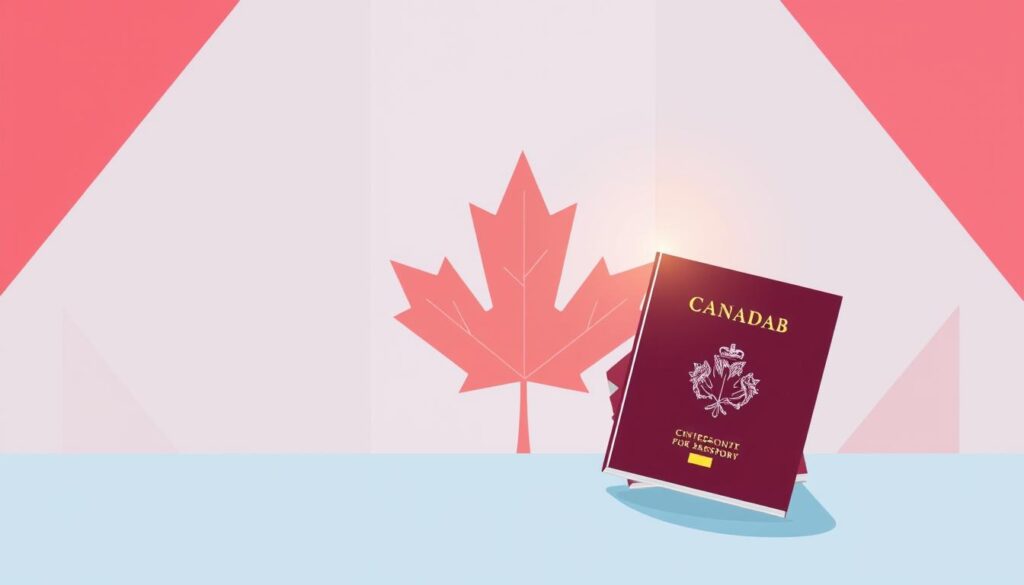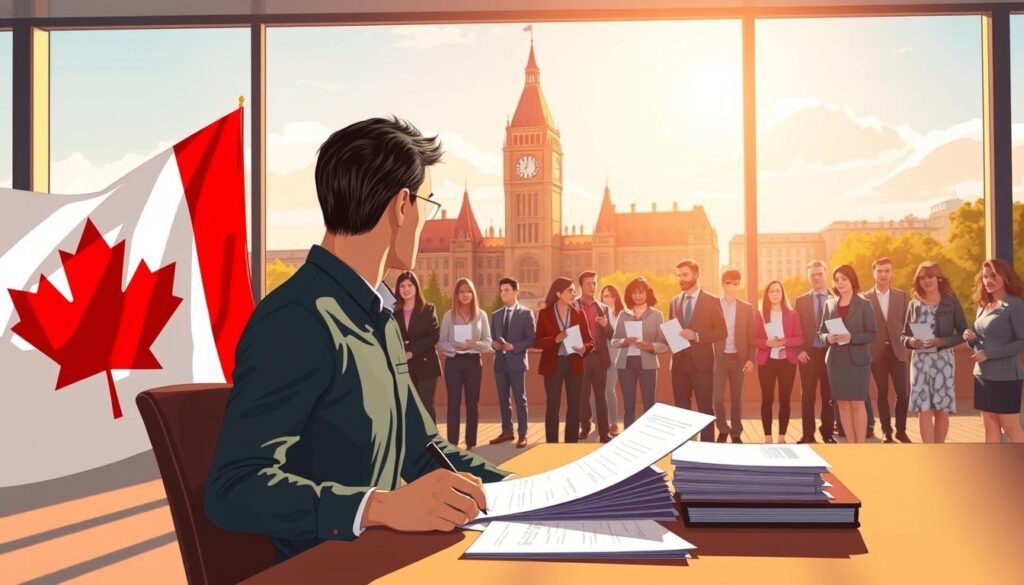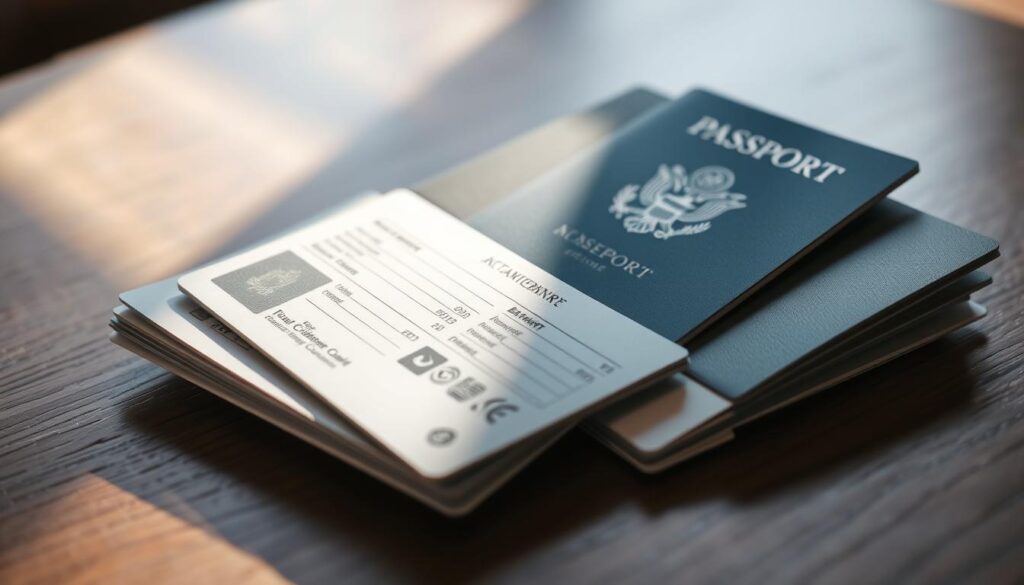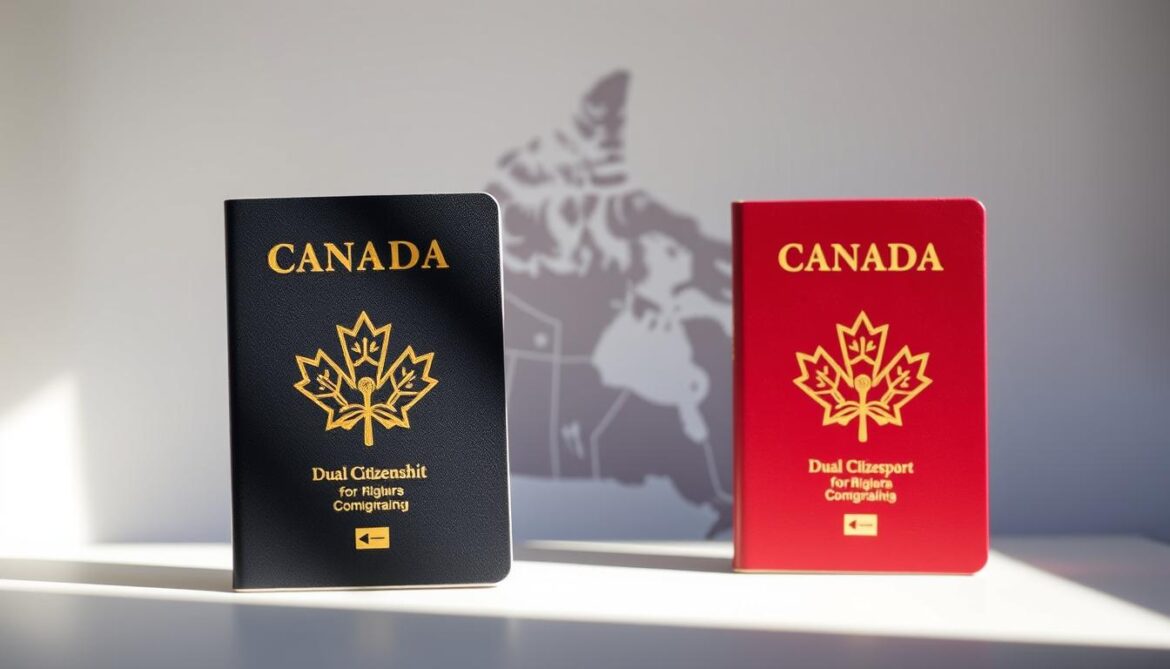Did you know nearly 49% of countries globally let people hold two passports? If you’re considering gaining status here, you’ll be glad to know this nation supports such arrangements. This legal recognition, often called dual citizenship, allows individuals to maintain ties to their homeland while enjoying Canadian benefits.
Navigating this process requires understanding both local and international laws. Your ability to retain original nationality depends on your home country’s regulations. Always verify their policies before applying here.
The government provides tools like the official visa portal to simplify applications. This resource offers step-by-step guidance on forms, requirements, and processing times. It’s particularly helpful for those managing obligations in multiple nations.
Key Takeaways
- Canada recognizes dual nationality under specific legal conditions.
- Nearly half of global jurisdictions permit holding two citizenships simultaneously.
- Your home country’s laws ultimately determine eligibility for dual status.
- Always consult both Canadian and origin country regulations before applying.
- The official visa portal streamlines application processes for newcomers.
- Maintaining two passports involves ongoing legal responsibilities in both nations.
Canada’s Legal Framework: Does Canada Allow Dual Citizenship?
Many nations restrict multiple nationalities, yet Canada embraces this practice with specific regulations. The country’s policies let you keep your original citizenship while gaining new rights here. However, your ability to maintain both statuses depends on legal agreements between nations.
Overview of Legal Provisions

Canadian law explicitly states that holding another passport doesn’t affect your status here. “A person who is a citizen has all the rights and obligations of citizenship,” notes the Citizenship Act. This means you can vote, work, and access healthcare while retaining ties to your birth nation.
Some governments, though, view dual nationality as unlawful. For example, Iran automatically revokes citizenship if you naturalize elsewhere. Always verify your home country’s stance before applying.
Understanding Home Country and Canadian Laws
Your obligations shift based on where you live. If residing in Canada, local statutes govern taxes and military service. When visiting your birth country, their rules apply – even if you’re also a citizen here.
Japan and India, for instance, require entry on their passports if you’re a national. Research both jurisdictions’ requirements to avoid penalties. A legal advisor familiar with cross-border issues can clarify overlapping responsibilities.
Why Consider Dual Citizenship in Canada?
Holding two nationalities unlocks unique opportunities but requires careful planning. This status lets you access distinct advantages while managing cross-border responsibilities. Let’s examine what makes this arrangement valuable and complex.

Key Advantages of Multiple Nationalities
Carrying two passports simplifies international movement. You can bypass visa queues when visiting family abroad or conducting business trips. Many find this particularly useful for frequent travelers with ties to multiple regions.
Social programs like healthcare and education become accessible in both nations. You might qualify for pension plans or unemployment benefits across borders. Property ownership rules also relax – no extra permits needed for real estate investments in either country.
| Benefit | Impact | Example |
|---|---|---|
| Passport Access | Visa-free travel | Visit 185+ countries |
| Social Services | Dual healthcare access | Medical coverage in both nations |
| Property Rights | No ownership limits | Buy homes without restrictions |
Managing Cross-Border Responsibilities
Tax systems often create complexity. You might file returns in both jurisdictions simultaneously. Some states tax worldwide income, while others focus on residential earnings. “Always consult a cross-border tax specialist,” advises Toronto-based financial planner Mei Chen.
Military service requirements could resurface during visits to your birth country. Japan and South Korea enforce conscription laws regardless of secondary status. Legal advisors recommend checking obligations before making travel plans.
Balancing these elements requires organization. Use digital tools to track renewal dates for passports and residency permits. Schedule annual consultations with legal and financial experts to stay compliant.
How to Become a Canadian Citizen and Hold Dual Citizenship
Gaining status as a national here involves meeting specific benchmarks while respecting international agreements. The process rewards preparation and attention to legal details – let’s break down what you need to succeed.

Eligibility Criteria and Application Process
To qualify, you must first hold permanent residency status. You’ll need physical presence here for 1,095 days within five years before applying. Tax compliance matters – three years of filings (if required) demonstrate fiscal responsibility.
| Requirement | Details | Notes |
|---|---|---|
| Residency | 3 of last 5 years | Days calculated precisely |
| Language Proof | English/French CLB 4 | IELTS or TEF accepted |
| Citizenship Test | 20 questions in 30 mins | 80% passing score |
| Background Check | No serious convictions | Includes global records |
Applications can be submitted digitally if you’re 18+ and meet standard criteria. Paper forms remain available for special cases like family applications. “Always triple-check your supporting documents,” advises Vancouver immigration officer Liam Tremblay.
Important Tips for a Smooth Transition
Keep your permanent resident card valid throughout the process. Renew it six months before expiry to avoid delays. Track application timelines – current processing takes 12-18 months.
Prepare thoroughly for the citizenship test using official study guides. Practice mock exams to identify knowledge gaps. Language assessments require certified test results – schedule these early.
Note that criminal charges or deportation orders automatically disqualify applicants. Consult legal counsel if you have complex international obligations. Maintain organized records of travel dates and tax filings for seamless verification.
Country-Specific Considerations for Dual Citizenship
Navigating citizenship laws requires understanding how different nations view multiple allegiances. Your ability to maintain two passports depends entirely on your birth nation’s regulations. Some governments welcome this arrangement, while others impose strict penalties.
Case Studies: India, China, and the United States
India strictly prohibits holding two passports. Acquiring foreign status automatically revokes Indian nationality. Former citizens can apply for Overseas Citizen of India (OCI) cards, granting lifelong visa-free entry and property rights.
The United States takes a flexible approach. Americans becoming Canadian citizens face no penalties. You’ll simply renew both passports separately. “Most U.S. consulates handle dual citizen paperwork routinely,” notes immigration lawyer Raj Patel.
China’s policies create unique challenges. Authorities refuse consular assistance if they consider you a Chinese citizen. This applies even if you hold a Canadian passport. Filipino-born individuals fare better – their government permits dual status through birthright provisions.
Home Country Restrictions and Alternatives
Nations like Afghanistan and Iran don’t recognize multiple nationalities. You might lose inheritance rights or face military conscription during visits. Always verify local laws through official channels before applying.
Some countries offer middle-ground solutions. Pakistan allows permanent residency without citizenship forfeiture. Cameroon permits dual status only for minors. Research alternatives like residency permits or special visas if full citizenship isn’t possible.
Consult legal experts familiar with both jurisdictions. They can help navigate complex scenarios like property transfers or tax filings across borders. Proper planning prevents unexpected loss of original rights.
Implications of Dual Citizenship on Travel and Taxes
Managing international obligations requires careful navigation of cross-border rules. Your ability to move freely and comply with fiscal responsibilities depends on both nations’ policies. Let’s explore how these factors shape your global mobility and financial planning.

Travel Requirements and Consular Services
When visiting your non-Canadian homeland, local authorities often require entry using their passport. Israel and Brazil enforce this strictly – arriving on foreign documents may trigger fines. Always check entry/exit protocols before booking flights.
Some nations impose exit visas or registration mandates. Egypt requires dual nationals to declare foreign status upon arrival. Syria enforces exit bans for citizens with pending legal matters. “Carry both passports but present them strategically,” advises Montreal travel consultant Amélie Dubois.
Access to Canadian consular services might be restricted if your other homeland claims you as their citizen. Chinese officials often deny consular assistance during emergencies. Keep embassy contacts handy and understand jurisdictional limitations.
Understanding Taxation in Multiple Jurisdictions
Filing taxes becomes complex when two countries claim fiscal residency. The United States taxes global income regardless of residence. Canada uses a residential system – you pay taxes only if living here 183+ days annually.
Key factors influencing tax obligations:
- Residency status determination in both jurisdictions
- Tax treaty provisions between nations
- Foreign income reporting requirements
- Credits for taxes paid abroad
Eritrea and Myanmar impose citizenship-based taxation, requiring payments even if you’ve never resided there. Consult cross-border accountants to optimize filings and avoid penalties. Proper documentation proves essential when claiming foreign tax credits.
Remember: Air travelers must present a valid Canadian passport when returning home. Other documents won’t suffice at border control. Update expiry dates well in advance to prevent travel disruptions.
Navigating Application Processes and Access to Consular Services
Preparing for international travel with multiple passports requires strategic use of official resources. Knowing when and how to engage consular support ensures smoother journeys across borders. Let’s explore tools that simplify cross-national obligations.

Resources for Canadian Consular Assistance
For emergencies abroad, contact Global Affairs Canada’s 24/7 Emergency Watch Centre. “Always register your travel plans online before departure,” advises consular officer Marie-Claude Bouchard. This free service helps authorities locate you during crises.
Use the Canada visa portal to access application checklists and processing timelines. It clarifies requirements for citizenship certificates and passport renewals. Bookmark the Travel Advice page for real-time updates on entry rules and safety alerts.
Managing Dual Citizenship Documents and Passports
Carry both passports when traveling but present them appropriately. Enter/exit Canada using your Canadian passport – airlines won’t board you without it. Use your other nationality’s document when entering that country.
| Resource | Purpose | Example |
|---|---|---|
| Emergency Contacts | Crisis response abroad | +1-613-996-8885 |
| Visa Portal | Application tracking | Check processing status |
| Travel Advisories | Country-specific rules | Entry bans or visa changes |
| Passport Rules | Air travel compliance | Expiry date management |
| Document Tracker | Renewal reminders | Set mobile alerts |
Some nations restrict consular access if they consider you their citizen. In Lebanon or Algeria, Canadian officials may face challenges assisting you during legal disputes. Update emergency contacts in both passports annually.
Conclusion
Maintaining legal ties to two nations opens doors to global opportunities while requiring careful navigation of cross-border rules. Canadian dual citizenship lets you access healthcare, education, and visa-free travel benefits across multiple jurisdictions. However, this arrangement demands ongoing awareness of tax filings and potential military obligations in your birth country.
Your ability to retain original citizenship depends entirely on your homeland’s policies. Nations like the United States embrace this status, while others like India impose strict prohibitions. Always verify regulations through official channels before initiating immigration processes.
Travel documentation requires strategic planning. Present passports appropriately at borders and renew them well before expiry dates. Remember that some governments limit consular support if they consider you their national first.
Use tools like the official visa portal and consult cross-border legal experts to simplify applications. With proper preparation, you can enjoy the privileges of dual citizens while fulfilling responsibilities in both nations effectively.



